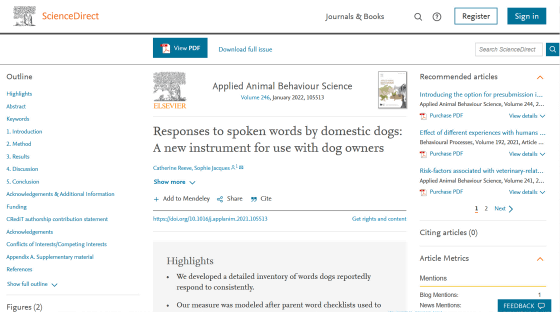Studies show that dogs understand 89 words and phrases on average

Dogs are animals that have lived with humans for a very long time, and research results have been reported
Responses to spoken words by domestic dogs: A new instrument for use with dog owners --ScienceDirect
https://www.sciencedirect.com/science/article/pii/S0168159121003002

Dogs Understand an Average of 89 Unique Words And Phrases, New Research Shows
https://www.sciencealert.com/dogs-respond-to-an-average-of-89-unique-words-experiment-finds
The average dog knows 89 words and phrases
https://www.zmescience.com/science/the-average-dog-knows-89-words-and-phrases/
The first domesticated dog has lived in human society for many years, and in recent years it has been a search and rescue dog that tracks missing and victims and a guide dog that supports visually impaired people. We are involved with humans in various ways, such as drug detection dogs that sniff out the smell of drugs. The ability of dogs to respond to the social cues given by humans is essential to fulfilling these missions.
The social clues that humans give to dogs include gestures, but there are also many linguistic instructions such as 'wait' and 'sit'. The dog has been performed from old studies on the ability to understand words, in 1928 named 'Fellow' German Shepherd is, and recognized the words and phrases of the owners emit 68 research results announced It has been. A 2004 study also reported that Border Collie 's 'Rico' identified more than 200 items, including various balls and stuffed animals, by their individual names.
The results of these studies are in line with the rule of thumb that many owners feel that dogs can understand human language to some extent. However, because fellows and Rico are well-trained dogs and have a small sample size, the Dalhousie University research team decided to conduct a more in-depth study of how common dogs understand the language. I did.

The research team quantitatively determines the number of languages that dogs can understand, based on a checklist for psychologists to assess infant language development, called the MacArthur-Bates Communicative Development Inventory. We conducted a survey to measure.
In the study, a total of 165 dog owners, including different breeds, reported on a 0-5 scale how dogs responded to 172 words and phrases prepared by the research team. This scale is determined by whether the dog looked up at the owner, barked, ran, shook his tail, or obeyed the word when he spoke the word. He did not take consistent or concrete actions, and when the word was '5', he acted in the same way even if the words were spoken in different situations. The owner was also able to report words and phrases that his dog might understand, in addition to those prepared by the research team.
Analysis of the findings revealed that dogs responded to 89 words on average, with the most responding to 215 and the least responding to 15. More than 90% of the total recognized 10 words and phrases, and besides 'dog's name', 'sit', 'come', 'good boy / girl', and 'good boy' It was an instruction (command) to the dog such as 'down', 'stay', 'wait', 'no', 'ok', and 'leave it'. Also, words such as 'treat', 'breakfast', 'dinner', 'garbage', 'poo', 'ball', and 'squirrel'. The response rate to was also high. On the other hand, few dogs understood 'wipe your feet,' 'whisper,' 'loud,' and 'antler.'
The image below is a graph of the number of words and phrases that 'NON Professional Dogs' and 'Professional Dogs' can understand. Dogs that have been trained as military dogs, police dogs, search and rescue dogs, etc. were 1.5 times more understandable than unspecially trained dogs, the researchers say.

In addition, the response to words was different depending on the breed, and the breeds that responded well were
However, in this study, the number of samples for each breed is not so large, and there may be subjective variations in interpreting the behavior of dogs, so it is not possible to draw conclusions on understanding dog breeds and words. It's too early. Also, many of the dogs surveyed had basic training as domestic dogs, which could be less than 89 words for completely untrained dogs, as well as human gestures and other things. It has also been pointed out that the contextual information of the dog may have been incorporated into the judgment.
Still, the research team argues that the findings are an important step in identifying words that dogs are likely to react to. 'Further research makes our tools an effective and economical means of mapping that ability (the ability of dogs to recognize words and phrases), early on the potential of individual dogs for different professions. It may be useful for predicting, 'said the research team.

Related Posts:







